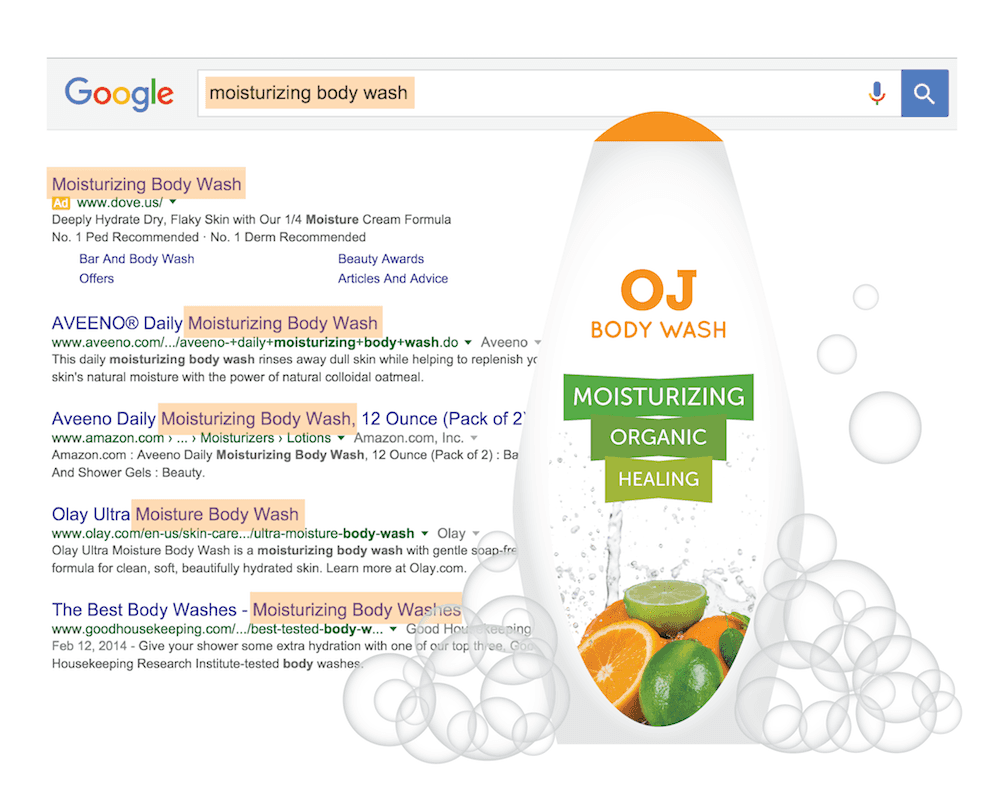3 Ways to Boost eCommerce Title Tag Effectiveness

There are a few things SEO analysts do every single day: eat breakfast, read up on SEO news, and evaluate title tags. Title tags are a little more complicated than picking what kind of cereal to eat for breakfast. From virtual insurance marketplaces to local plumbing services, search-engine-optimized websites typically have pages with title tags that greatly differ in structure.
Need a title tag refresher? It’s simply an HTML element that describes content on a page. Ultimately, title tags are one of the primary on-page elements that search engine robots (or “spiders”) analyze to index pages into search engines and to then match pages with user search terms.
Title tags are especially crucial for eCommerce websites because they help generate relevant organic traffic to certain product pages you want people to visit. After all, if you want users to land on a product page about your company’s moisturizing OJ Body Wash, you need to optimize your title tags to include the brand name and valuable descriptive words. (And yes, I clearly have breakfast on the mind. I might’ve forgotten to have a balanced breakfast of cereal and orange juice this morning.)
Here are three ways to boost eCommerce title tag effectiveness.
1. Search volume, baby
Keyword research is integral to eCommerce title tag creation. There are several tools you can utilize for keyword research, but SEMrush is one of my favorites. Read more about keyword research and SEMrush here.
You should choose relevant keywords that have adequate monthly search volume. For example, you would want to choose keywords for your title tag that have more than a 1000 monthly searches (if possible), while also keeping an eye on search competition.
Search competition is an approximated amount of search listings for a respective keyword. Go with keyword options that have the lowest comparable search competition and high search volume. It’s a fine balance between the two; you want the best of both worlds.
2. Title Tag Structure
To put it simply, title tag keywords need to be relevant to on-page content. Users want to land on a page that’s relevant to their search. How would you feel if you searched for a moisturizing body wash but landed on a page about how to change a tire? Irrelevant, incorrect title tags are misleading and will surely lead to a high bounce rate.
The first step is to ensure that you include clear, relevant keywords for the specific product page you’re working on. After completing keyword research and choosing high search volume/low search competition keywords, you can now start creating your title tag. Your eCommerce title tag should consist of one primary keyword at the beginning (the product name or category) followed by 3 secondary keywords or “modifiers”
“Product Name” | Modifier 1, Modifier 2, Modifier 3
Now, let’s apply this structure to a sample body wash product page for a hypothetical grooming product website.
OJ Body Wash | Moisturizing, Organic, Healing
This example title tag is now targeting user searches for the product name keyword (the primary keyword) as well as specific long tailed keywords such as moisturizing body wash, organic body wash, and healing body wash. Additionally, it’s important to keep title tag length in consideration. The goal is to create title tags that are under 60 characters in length so that search engines don’t truncate title tags on search result pages.
3. Brand Name Keywords
The third keyword modifier (or second modifier, if you are running out of room) can also be reserved for brand name keywords. Brand keywords include store names or store subsidiaries/extensions. Brand keywords are especially important for branded keywords that have high search volume. You can research how valuable the brand is on SEMrush. In these instances, these branded keywords are important to organic traffic so even shorted brand keywords should be used at the end of title tags.
ABC Body Wash | Moisturizing, Organic | ABC Grooming Co.
ABC Body Wash | Moisturizing, Organic | ABC Grooming
With or without branded keywords, eCommerce title tags are essential elements to plan for when optimizing product pages and categories. Dedicate time for keyword research, choose a few high-search volume (and low-competition) keywords, and before you know it – you’ll be earning the organic traffic that your website deserves.
—
Do you have any eCommerce title tag tips? Isn’t breakfast the most important meal of the day? Tweet us @Perfect_Search or email us at info@perfectsearchmedia.com.

David Feldbaum comes to Chicago from Memphis, Tennessee. He sincerely wishes he and Jon Snow could be best buds, and says the coolest thing he’s ever done is bungee jump over the highest legal bungee site in the world (Queenstown, New Zealand).
